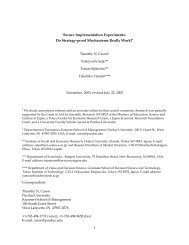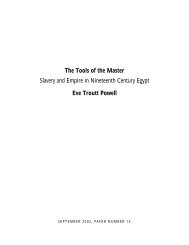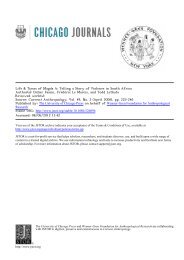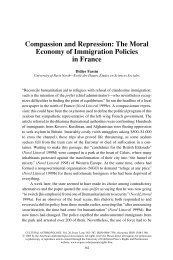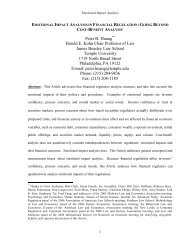Governance, Growth, and Development Decision-making - School of ...
Governance, Growth, and Development Decision-making - School of ...
Governance, Growth, and Development Decision-making - School of ...
You also want an ePaper? Increase the reach of your titles
YUMPU automatically turns print PDFs into web optimized ePapers that Google loves.
at least for limited periods. 3 That is, elites can grant property rights<br />
to themselves, or else create complex rules allocating rents, in ways<br />
that still support growth. There are, however, important political<br />
consequences <strong>of</strong> partial property rights regimes that have feedback<br />
effects on growth through the social or political channels (see below).<br />
Property rights are more important to growth than individual human<br />
rights (e.g., freedom <strong>of</strong> speech, association, religion) or political<br />
rights. We know <strong>of</strong> many fast-growing regimes that <strong>of</strong>fer full, partial,<br />
or quasi-property rights without protecting other types <strong>of</strong> individual<br />
rights (China, Malaysia, Singapore, the United Arab Emirates).<br />
The relationship between political accountability (a.k.a. democracy)<br />
<strong>and</strong> growth is quite complex. In the aggregate, the relationship<br />
between growth <strong>and</strong> democracy has been generally seen to be significantly<br />
weaker than the reverse relationship between democracy <strong>and</strong><br />
development. 4 There is also a great deal <strong>of</strong> confusion as to how to<br />
measure the degree <strong>of</strong> democratic accountability, since democracy<br />
itself is a multidimensional collection <strong>of</strong> inter-related institutions. 5<br />
3<br />
For example: Haber, Stephen, Arm<strong>and</strong>o Razo, et. al. (2003). The Politics <strong>of</strong><br />
Property Rights (Cambridge: Cambridge University Press); Khan, Mushtaq<br />
H. <strong>and</strong> Kwame Sundaram Jomo, eds., (2000). Rents, Rent-Seeking <strong>and</strong> Economic<br />
<strong>Development</strong>: Theory <strong>and</strong> Evidence in Asia (Cambridge: Cambridge<br />
University Press)<br />
4<br />
See, inter alia: Lipset, Seymour Martin, (1959). “Some Social Requisites <strong>of</strong><br />
Democracy: Economic <strong>Development</strong> <strong>and</strong> Political Legitimacy,” American<br />
Political Science Review 53: 69–105<br />
—Diamond, Larry, (1992). “Economic <strong>Development</strong> <strong>and</strong> Democracy Reconsidered,”<br />
American Behavioral Scientist 15(4–5): 450–499<br />
—Barro, Robert J., 1997. Determinants <strong>of</strong> Economic <strong>Growth</strong>: A Cross-Country<br />
Survey (Cambridge: MIT Press)<br />
Przeworski, Adam, Alvarez, Michael et. al., (1996). “What Makes Democracies<br />
Endure?” Journal <strong>of</strong> Democracy 7(1): 39–55<br />
5<br />
‘Democracy’ is sometimes used interchangeably with “liberal democracy”<br />
(i.e., including rule <strong>of</strong> law, which does not always accompany democratic<br />
institutions). Democracy is also sometimes identified with checks on executive<br />
authority (see Acemoglu <strong>and</strong> Robinson 200?; Kaufmann <strong>and</strong> Kraay<br />
2005). However, a British-style Westminster system has very few formal<br />
checks on executive power when compared to an American-style presidential<br />
system (see Fukuyama 2007); yet both types <strong>of</strong> democracy have been<br />
able to sustain high long-term growth rates.<br />
28<br />
<strong>Governance</strong>, <strong>Growth</strong>, <strong>and</strong> <strong>Development</strong> <strong>Decision</strong>-<strong>making</strong>



